The Treasure Keeper Read online
Page 8
I found you a small trinket today in the Town of Amiens, a very little Stone but one I trust will Please you, and it is from here I shall Post this Message. You are in my Fondest thoughts and dreams. I pray you remember me the Same,
Yours,
H.
The morning was not quite warm enough to melt the sludge of the coach yard entirely, and the turned-up edges of mud sparkled with frost under the sun like sea glitter with Zoe’s every step. There were cobblestones visible under the mud, but they appeared and disappeared like red rock islands in that dirt-and-straw sea. It had rained late last night and then dropped to freezing, and the yard still hadn’t been scraped clean.
Travelers clumped back and forth along wooden planks laid in paths over the muck, a great busy swarm of men and women and children hastening from plank to plank, and stableboys not bothering with any of it, stamping in their boots straight alongside. Everyone was talking, moving, pointing. An incoming postboy blew his horn as his berline clattered through the brick-pillared entrance, a set of six matched grays and a crest on the door, the heavy wheels spinning so close to the path that more than a few of the people jumped from the wood to the mud on the other side, cursing.
Zoe lingered near the entrance of the yard, fingering the letter she kept in her reticule, observing the commotion.
Hayden had been correct: Horses were a problem. And as this particular coach yard was the busiest she’d seen so far, it held many, many horses, most of them fresh from their stalls and eager for their paces. A few were already beginning to notice the scent of predator in the air, skins twitching beneath their harnesses as they turned their heads toward her, curled back their lips.
A tabby cat with a white spot on its nose had been grooming itself atop one of the pillars; it appeared oblivious until the breeze shifted, pushing past Zoe, ruffling the edging of her coat.
The cat ceased its bath, orange eyes opening wide. With an impressive arch and a hiss it leapt away, fleeing with a bristling striped tail toward the stables just visible past the ticketing office.
There was no help for it, though. She waited, hoping the wind would shift again, but when it didn’t she lifted her chin and walked rapidly into the human crowd.
The planks wobbled with every step, bouncing like a child’s seesaw. A woman in a stern black bonnet with a little girl in tow shoved past without a word, her bag smacking Zoe in the hip. A man coming from the other direction touched a hand to his cocked hat as he smirked at her; she lowered her gaze and concentrated on keeping her footing.
The horses downwind began to make noises of distress. The grays in particular grew skittish, starting to kick; they’d been led too close to the path, and the postboy atop the lead had to drop his horn to hold on with both hands.
She held her breath and picked up her pace, overtaking the woman with the bag again, ignoring the woman’s startled glance past the brim of her bonnet.
The ticketing office was also brick, two-thirds of it covered in a tangle of ivy that had already withered brown with the coming winter. There was a queue to get in. There was a queue to go around. She drew up as close as she could to the main doors and pulled her coat closer, shuffling along as the animals all around slowly began to work themselves into a frenzy.
The main doors to the office were open to accommodate the line. The windows were closed and paneled in glass, the old-fashioned kind, thick and round and wavy. The plank path angled away from them in such a way that she couldn’t see her likeness. But she saw the shadow there anyway. The dead man watching her, distorted with the panes.
“Go away,” Zoe murmured under her breath, a puff of frost rising to her nose.
No one noticed. The queue crept along.
As she drew closer the lines and shapes of him grew more distinct, the smoke a nimbus of twists and curls warped with the shape of the blown glass.
He didn’t move. She felt his gaze again, felt the intensity of his look.
When she’d awoken this morning she’d been alone; even the ghosts in the mirror had shrunk down to nearly nothing, flitting back and forth like fireflies against the indigo blue. After dressing she’d dared a peek at the window, but it had been only a window again.
She’d decided to skip her daily routine at the Palais Royal. She’d return to her original plan, the one she’d been following before she’d caught that single phrase about the sanf. She’d consumed enough coffee to last her a lifetime, anyway.
Three feet from the rounded-glass window the shadow turned to follow her, still not speaking. Not leaving. But it was him, no doubt. She recognized that stance, relaxed and tall and proud. The span of his shoulders, the curl of his hair.
A man in a teal surtout and scuffed boots at the ticketing desk was quarreling with the clerk, flourishing a sheaf of papers and speaking with his hands in that way Zoe had noticed was particular to the French: wide, emphatic gestures that managed to be both elegant and slightly dangerous for anyone standing too near. She was inside the office now, out of the sun but too far from the fire crackling in the hearth on the other side of the room to be warmed. The chairs, the walls, the very floor: Everything stank of people and hay and stale garlic.
An enormous framed map on the wall showed the maze of Paris, circles and circles of streets with black lane spokes fanning out in every direction. It was covered in glass, smeared with fingerprints. Two small girls and an older boy stood beneath it, sharing a sweetmeat with guilty glances.
The shadow emerged like a slick from the eastern corner, even more of him than the window had revealed.
After one quick glance Zoe turned and faced ahead. She was next in the queue. Finally next.
“Yes, which province?” intoned the agent, without glancing at her. He was busy stamping the sheaf of papers the man had given him, marking whatever it was with bright red ink, one page after another after another.
“I beg your pardon. I’m here to inquire about a passenger that might have been through a few months past.”
The clerk snorted a laugh, still without glancing up. He was middle-aged and potbellied, and his wig badly needed to be floured.
“We are the largest yard in the city, Madame. We have many passengers.”
“Mademoiselle,” Zoe corrected, and smiled when his eyes flicked to hers.
“Mademoiselle,” he repeated, and set down his stamp. A frown line made a vertical crease between his eyebrows; his fingers were ink-stained, set lightly upon the book of tickets beneath his hands. “We have many passengers,” he said again, with a shade more courtesy. “I’m afraid there is no way to discover who has come and gone.”
“This man would have hired a coachman from you. He was English, and had a private carriage.”
The clerk shook his head and spread his hands, his mouth pursed. “It is impossible, mademoiselle. There are record books, of course, but we cannot allow the public—”
“Oh, but I’m not the public,” she said, lowering her voice but still smiling. “He’s my brother. It’s a family matter, you see. Please, monsieur. I’m … desperate to find him.”
At the edge of her vision she saw the shadow shift along the frame, sliding closer.
“I’m sorry.” And the clerk truly did look sorry, the vertical frown deepening, color stealing in a hot flush up his neck. His fingers did a fretful tap across the ticket book. “It cannot be done.”
“You don’t have it,” said the shadow in blunt English. “Give it up. It’s not your Gift.”
The varied skills of the drákon threaded through the tapestry of their bloodlines like brightly woven strands of silver and gold, stronger in some families, weaker in others. Most of the menfolk of the shire could still Turn, less than a handful of the women. But everyone heard the music of the stones and stars. Everyone knew how to hunt with talons or simply guns; how to lope through the forests unseen; how to taste the flavors of the wind; to feel the coming rain humid along their skin, or the bright full moon rising in their blood. Barring Zoe’s own
strange talents, it wasn’t usually difficult to predict which child would grow to inherit the best of their ways; their lineage was, after all, strictly controlled. But one of the few Gifts that eluded prediction, time after time, was that of Persuasion. The ability to direct the Others to a dragon’s will merely by using her voice.
And Rhys was right. It wasn’t her Gift.
Damn it.
“Please, mademoiselle. I must—I must help the next customer. My most profound apologies.”
“Of course. If only there was someone else I could speak to. Someone perhaps to show me the books …”
Like a trained dog responding to a cue, the man glanced swiftly over his shoulder, to a half-cracked door revealing a rectangle of wainscoting and pale blue wallpaper. The plaque on the door was speckled brass. It was etched in scrolled lettering: M. Racine.
“It cannot be done,” the clerk said once more.
Zoe bowed her head in acquiescence, moving meekly aside. The woman in the black bonnet pressing close behind her huffed audibly and stepped up to the desk. The girl dragged behind watched Zoe with solemn chocolate eyes.
“A noble effort,” said the shadow. “Well played. Now go home.”
She winked at the girl and walked away, easing around the line of impatient travelers, back into the brilliance of the day. She paused to take a breath of nongarlic air, and a bay being led by a groom close by shied away with a squeal of white frost, hauling the man with him through the mud.
Time to go. Yet once back at the street Zoe did not turn left, the way to Tuileries. She went right instead, very quickly, past the tavern that had a spill of journeymen lounging menacingly upon its steps. Past the cigar shop with the broken bell over its door, leaking the bouquet of dried tobacco from the chinks in the jamb. Past the china dealer, and the stay maker, until she found just what she was looking for.
The next storefront was empty; she’d taken good note of that on her way to the coach yard. From the peeling paint on the sign she guessed it had once been the establishment of a tailor, but the windows now were covered in soot, and the few shelves that she could see inside had been cleared. It had the advantage, moreover, of a back door in the alley just around the corner and a lock that had corroded into flakes. She could smell the rust of it, even from here.
It took only a quick glance around and a squeeze of the latch for the door to give way. And she was safely inside before the journeyman who had ambled up to follow her could discover where she’d gone.
Dust coated everything. The light from the windows in the front room was positively brown; combined with the cool damp air it gave her the sensation of stepping into a cave. A very musty cave.
She crossed to a table pushed askew against the back wall and lifted her arms to remove her pins, and then her hat. When she peered aside to make sure the windows were truly out of the line of sight, her right shoe crunched against glass.
“This isn’t home,” said a voice nearby, very dry.
Zoe bent down to examine the glass more closely. A shattered mirror. Of course. And Rhys, the smoky darkness that shimmered from piece to piece.
“It isn’t,” she agreed, stepping away, beginning to pull at her gloves.
“Forgive me, I can’t really tell,” he said. “But isn’t it a bit brisk for disrobing?”
She paused and arched a brow at the largest shard. “Not that you’re complaining, my lord?”
“Not in the least. But Zoe … what are you doing?”
“Kindly don’t look.”
“What?”
“Don’t. Look.”
“Are you disrobing?” The shadow seemed to grow darker, thicker, agitated across the broken glass.
“I am. Fine, then. Go ahead and look. It hardly matters anyway.
She wore a chemise dress of long-sleeved lavender merino, stylish and warm and relatively simple. No hoops, no bustle to hinder her, only a tube of fitted cloth and a wide gray satin sash that tied beneath her breasts. It was dreadfully daring, but for all its modish fashion, she’d purchased it for only one reason, that it was easy to slip on and off.
She glanced down at the pieces of mirror, running her fingers along the sash.
“Are you watching?”
“Oh, yes,” he said, low.
“Excellent.” And she let her Gift loose, every inch of her becoming transparent.
The shadow did not move. Nor did he speak; perhaps she’d finally shaken him speechless. But she could see him still there on the floor, a flat darkening in the debris.
She worked quickly now, feeling the cold despite her bravado. The dress and cloak and petticoats, the corset, garters, stockings. Shoes. Reticule. She picked up everything, stepping carefully over the glass, folded it, and set it all upon the table by her hat.
Rhys apparently found his voice. “What are you doing?” he demanded as she began to open the door to the alley. “Zoe! You can’t go out there like that!”
“Don’t worry. I’ll be back soon.” And she closed the door gently behind her.
She was insane. She must be. It was the only explanation. Why else would a grown woman—a drákon woman, raised in their own wild ways, certainly, but always to modesty—go out in public without a stitch of clothing on her body?
He cast out his senses to find her again, frantically. It took him a good long moment to separate himself from the abandoned storeroom with her garments. He tried to focus on her—eyes, lips, anything—but what he kept seeing was the hem of her gown, a demure purpled fold draped carelessly over the edge of the table, trimmed with gray ribbon. Feminine. Discarded.
Then he was back in the coach yard. He was gazing out from the same place as before when he’d first caught sight of her, all the dim-faced people shoved into their lines, carriages careening through, rumpled passengers emerging from dark interiors to squint at the light of day.
And Zoe. Right there, right there, picking her way nude through the stiffened mud, arms out, lips compressed, every single steed she passed bucking in its traces to the shouts of the coachmen and guards.
No one human even glanced at her. A modern-day Godiva, tiptoeing through a mass of Others, sunlight bouncing off her bright hair and bare skin like a halo from heaven itself. And no one even looked.
Getting through the main doors was the most difficult part. She had to wait until the family clumped there were summoned inside en masse, father-mother-daughter-daughter-son, until there was room enough to sidle by them. Even still she’d bumped the elbow of the eldest daughter, who swatted at the air in a distracted sort of way, listening to her father argue for better seats on the stage to Limoges.
The clerk had slouched back in his chair with the weary mien of a man who’d suffered too long a day already. He certainly didn’t look up as Zoe slipped around his desk, moving quickly and silently to the door of M. Racine.
It was still only barely open. She was pushing it gradually wider, wider, until a sudden gust of wind from the main doors yanked it out of her hand, banging the edge hard against the wall.
The clerk gave an irritated sigh and scraped back his chair. She just managed to dart inside before he grabbed the knob and slammed the door shut.
Well. Here she was.
Monsieur Racine was not at his desk today, it seemed. His office was cramped and crammed from floor to ceiling with books and ledgers: leather-bound, cloth-bound, stacks and stacks of them. His oil lamps were unlit; his fireplace held a mound of gray-feathered ash, the coal bucket empty beside it. Another map on the wall, and a small, crude watercolor of a church. A rug, surprisingly plush, covered most of the floor; a caped greatcoat still swayed gently from its hook on the back of the door.
She shivered, reaching for the greatcoat. The sole window was shrouded with blond lace curtains and blocked with a fern on a pedestal. No one would see, and there was no sense in freezing before she was done.
Books. She started with the shelves closest to her, but they were all just columns of accounts, sums of figures wi
th odd abbreviations, sorted by year. Nothing about passengers. She moved on to the next shelf, and the glass face of the map of France shifted into dusk.
“Zoe?” His voice was very soft now.
“Yes,” she whispered, even softer, her unseen finger tracing the years imprinted on the spines in front of her. “I can’t talk now.”
1777. 1778. 1779 …
Approvisionnements. Chevaux. Bureaux des douanes.
“Zoe … why is it no one sees you?”
Clients.
She let out her breath in relief, pulling free the book marked 1781/janvier-juin, flipping quickly through the pages. The cuffs of the coat sleeves were much too long; they kept catching against the paper.
“Zee.”
“Yes, fine.” She willed herself visible, sparing him a swift glance before going back to the book. “Invisibility. Another Gift.”
“Er …”
He sounded strange, strange enough for her to pause and shoot him a longer look. The smoke defining his edges lifted into coils, nearly alive; otherwise the shade of Lord Rhys Langford was motionless against the pastel colors of the map.
“What?” she asked, losing patience.
“Nothing. Sorry.” He seemed to run a hand through his hair. “Please, do carry on with your incredibly reckless behavior.”
A retort was on the tip of her tongue, but just then the heavy book shifted in her hands, and she glimpsed what she needed, what she’d been searching and hoping for all these weeks. She bent her head to the page and the words died unsaid.
The entry had been scratched by a quill clearly needing fresh ink. The letters were sketchy, almost faded, but their meaning came clear as crystal:
29 mai. Henri Jones, Anglais par l’intermédiaire de Calais. Cocher à Dijon: Alain Fortin. Payé entièrement, pièces d’or.

 The Second Mrs. Astor
The Second Mrs. Astor The Treasure Keeper
The Treasure Keeper The Deepest Night
The Deepest Night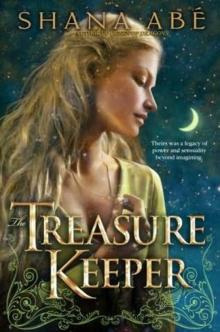 The Treasure Keeper d-4
The Treasure Keeper d-4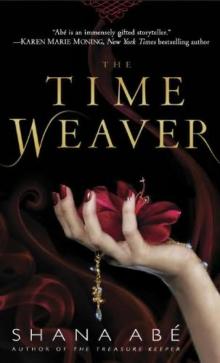 The Time Weaver d-5
The Time Weaver d-5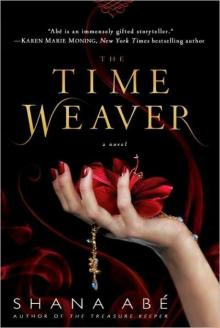 The Time Weaver
The Time Weaver The Smoke Thief
The Smoke Thief The Sweetest Dark
The Sweetest Dark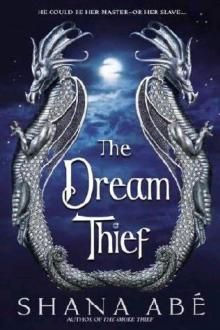 The Dream Thief
The Dream Thief The Deepest Night tsd-2
The Deepest Night tsd-2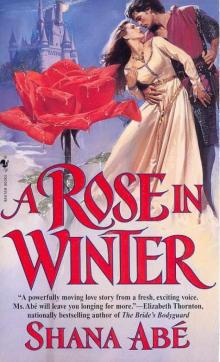 A Rose in Winter
A Rose in Winter Queen of Dragons d-3
Queen of Dragons d-3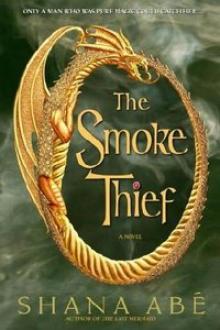 The Smoke Thief d-1
The Smoke Thief d-1